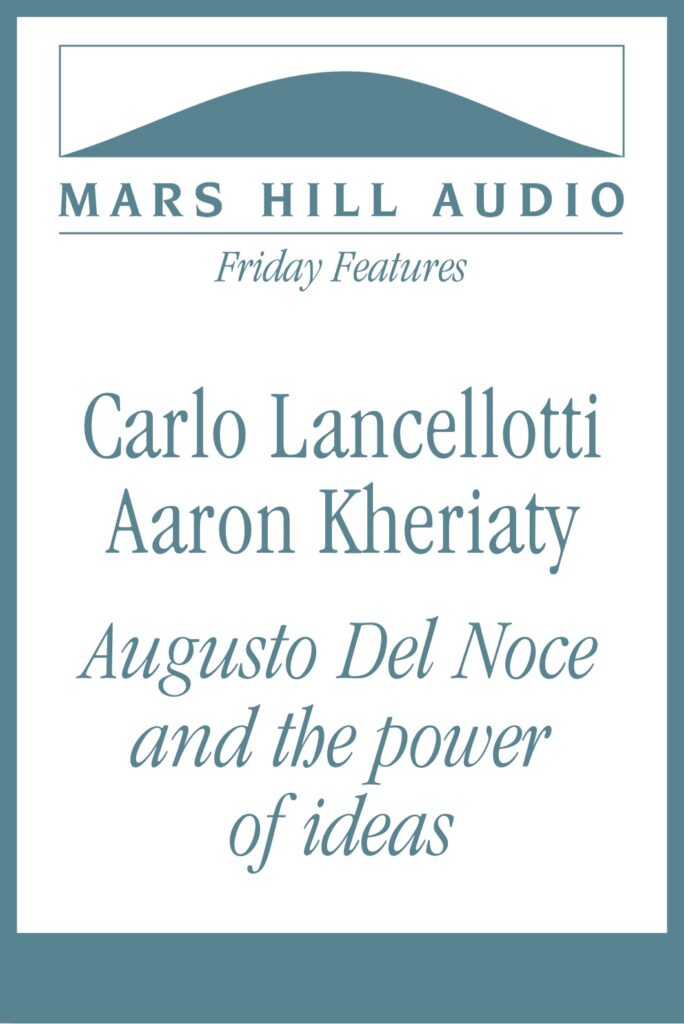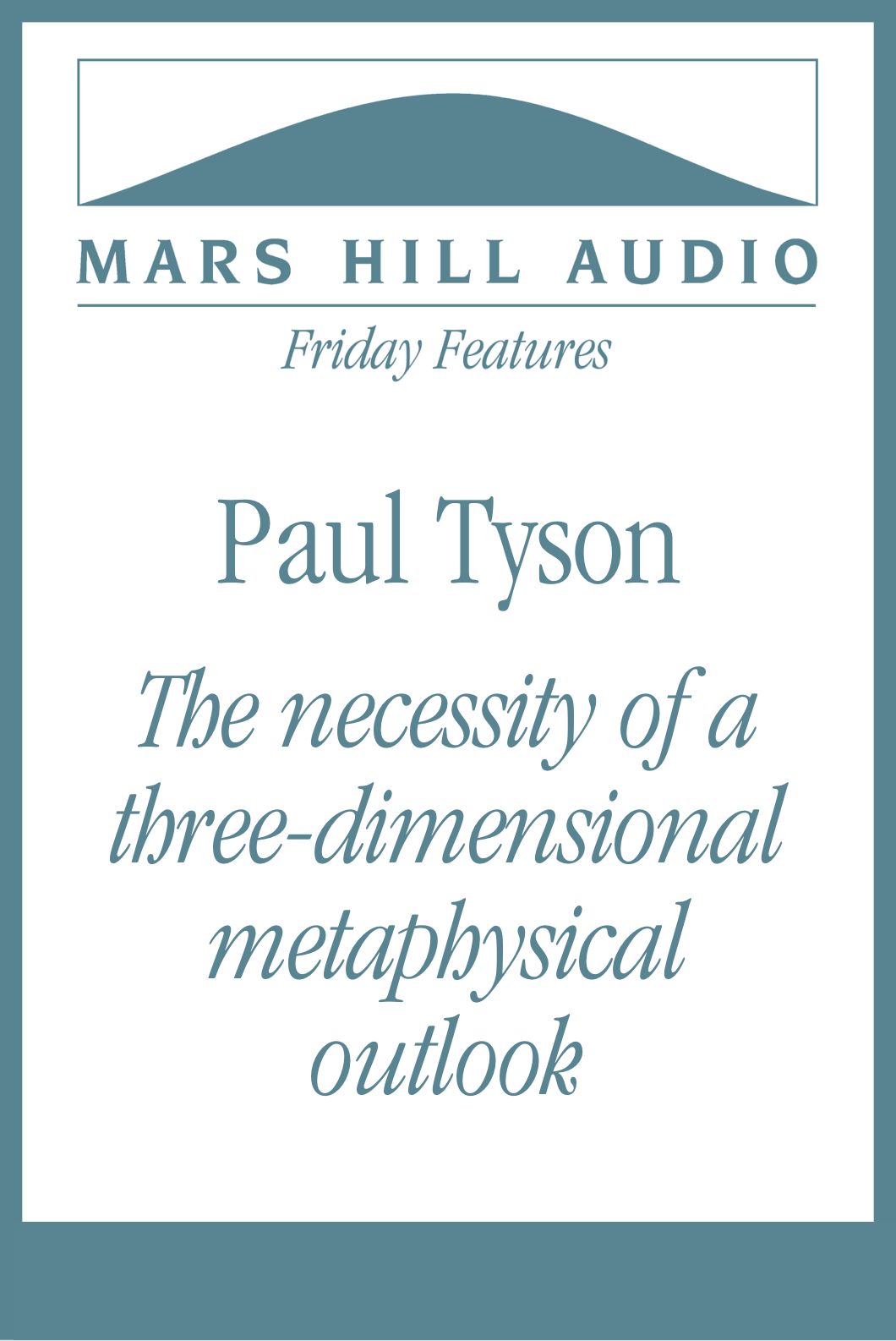
released 1/21/2022
Only in the past 10 years has the thought of Augusto Del Noce (1910–1989) been available and appreciated by English-language readers. This month, his major work The Problem of Atheism is being published in a translation by Carlo Lancellotti, who had already gifted English readers with two earlier anthologies of essays and lectures by Del Noce: The Crisis of Modernity and The Age of Secularization. In this Friday Feature — presented courtesy of Biola University — Lancellotti talks with Aaron Kheriaty about the central ideas in Del Noce’s writings.
43 minutes
PREVIEW
The full-length track for this audio is only available to paid members and to listeners with a free Visitor’s Pass. If you are a member, log in here. If you would like a Visitor’s Pass, sign in here. You may purchase one of our complete memberships here. Happy listening!
More to hear . . .
Modern societies typically hold to certain allegedly self-evident truths about the nature of knowledge. Lurking imperceptibly behind these “truths” is a story of human progress away from superstition into the light of Reason. In his book Returning to Reality, philosopher Paul Tyson imagines a grand “Song of Modernity.” In it, he captures the triumphant (and anti-Christian) sense of enlightenment characteristic of modern thought. On this Friday Feature, Ken Myers summarizes some of the key themes in Tyson’s book, and reads his instructive “Song of Modernity.”
This feature is available to listeners with a Mars Hill Audio membership.
Related reading and listening
- A poet’s relationship to time —
FROM VOL. 57 Poet Wilmer Mills (1969–2011) discusses how his agricultural and cross-cultural childhood in Brazil shaped his imagination and his relationship with modernity. (11 minutes) - Dickinson and modern malaise —
FROM VOL. 36 Roger Lundin explains how Emily Dickinson’s understanding of love, nature, religion, and mortality are modern in content. (11 minutes) - Modernity and the shaping of America —
FROM VOL. 48 Historian Jon Butler explains how aspects of modernity were already present and at work in colonial American life prior to 1776. (12 minutes) - The transforming power of false divinities — Romano Guardini on the danger of becoming like the gods we invent
- Submission to mathematical truth — In this lecture, Carlo Lancellotti argues that integration of the moral, cognitive, and aesthetic aspects of mathematics is needed in a robust liberal arts mathematics curriculum. (25 minutes)
- Mars Hill Audio Journal, Volume 163 — FEATURED GUESTS: Andrew Youngblood, R. J. Snell, Nicholas Denysenko, Nigel Biggar, Robert McNamara, and David Cayley
- “Gender” as ultimate separation — In this November 2018 lecture, Margaret McCarthy explains how the predictions of Pope Paul VI’s Humanae vitae regarding the consequences of separating sex from procreation have proven true. (38 minutes)
- Science’s need for philosophy and revelation — D. Stephen Long explores a consistent theme in the work of theologian Hans Urs von Balthasar: the relationship between Christianity, modernity, and secularity. (46 minutes)
- Why the sexual revolution “failed on its own terms” —
FROM VOL. 38 Wendy Shalit argues that when promiscuity is considered natural, women lose the leverage and power inherent in modesty. (13 minutes) - A metaphysics of realism, relationality, and personalism — John Milbank gives a survey and critique of the efforts of 20th and 21st century theologians to articulate a Trinitarian ontology that reflects reality and counters secularization. (61 minutes)
- Worldliness vs. otherworldliness —
FROM VOL. 38 Sociologist Craig Gay speaks of the charge that Christianity is an otherworldly religion. (12 minutes) - Recovering the primacy of contemplation — Augusto Del Noce finds in St. Augustine resources to diagnose the fatal flaw in progressivism
- Confronting the supremacy of science — Augusto Del Noce on the belief that science is the only true form of knowledge
- The roots of American disorder — In this reading of an article from 2021 by Michael Hanby, the critique of Marxism in Augusto del Noce’s work is compared with texts from the American Founders. (79 minutes)
- Augusto Del Noce’s critique of modernity —
FROM VOL. 128 Physicist and mathematician Carlo Lancellotti discusses the life and work of twentieth-century Italian philosopher, Augusto Del Noce. (25 minutes) - Faith as the pathway to knowledge — Lesslie Newbigin on authority and the Author of all being
- The integration of theoretical and mythic intelligence —
FROM VOL. 156 William C. Hackett discusses the relationships between philosophy and theology, and of both to the meaning embedded in myth. (29 minutes) - Christopher Hitchens vs. G. K. Chesterton — Ralph Wood compares Christopher Hitchens‘s view of the cosmos with that of G. K. Chesterton, arguing that Chesterton succeeded where Hitchens failed. (44 minutes)
- A fearful darkness in mind, heart, and spirit — Roberta Bayer draws on the work of George Parkin Grant (1918–1988) to argue that our “culture of death” must be countered with an understanding of reality based in love, redemptive suffering, and a recognition of limitations to individual control. (33 minutes)
- Insisting that political leaders are incapable of obeying Christ — Oliver O’Donovan on the unintended consequences of the First Amendment to the U.S. Constitution.
- An unwitting agent for the secularization of America — Mark Noll, Nathan Hatch, and George Marsden explain how a prominent Christian Founding Father added momentum to the secularization of America
- Cleansing sea breezes — Thomas C. Oden argues that rather than being conformed to contemporary ideological trends, we should be informed by 2000 years of the Church’s wisdom. And Darrell Amundsen corrects some false claims about the early Church’s views on suicide. (27 minutes)
- Divorcing the spirit of the age — Thomas C. Oden on overcoming the theological faddism of the late twentieth century
- Orienting reason and passions — In an essay titled “The Abolition of Mania” (Modern Age, Spring 2022), Michael Ward applies C. S. Lewis’s insights to the polarization that afflicts modern societies. (16 minutes)
- Faith and unbelief —
FROM VOL. 98 This Archive Feature revisits two conversations, one with Roger Lundin and one with David Bentley Hart, on what makes Christian belief so implausible to non-believers. (39 minutes) - Dreary atheist fundamentalism — David Bentley Hart defends the naturalness of religious belief against the assertions of the Naturalists
- Lessons from Leviticus — The book of Leviticus may be assumed to be irrelevant for charting a way through the challenges of modernity. Theologian Peter J. Leithart disagrees. (22 minutes)
- An outrageous idea? — In the late 1990s, George M. Marsden and James Tunstead Burtchaell both wrote books examining the claim that it was far-fetched even to imagine that scholarly work could be an expression of Christian claims about reality. (25 minutes)
- Once there was no “secular” — Carlos Eire on the metaphysical assumptions championed in the sixteenth century
- Resituating discussion of “science” and “religion” — Peter Harrison argues that modern Western culture’s partitioning of ‘science’ and ‘religion’ into distinct spheres is a novel categorical conception in history. (58 minutes)
- Sources of wisdom (and of doubt) — Roger Lundin shares what he has appreciated about Mars Hill Audio conversations, and he discusses what makes Christian belief so implausible to non-believers. (32 minutes)
- Art as aestheticism, love as eroticism, politics as totalitarianism — Augusto Del Noce on the “technological mindset” and the loss of the sense of transcendence
- The meaning of the modern eclipse of authority — Augusto Del Noce on the greatest modern reversal
- Explaining the totalitarianism of disintegration — Michael Hanby complements the analysis of modernity offered by Augusto Del Noce
- Marva Dawn on spiritual formation and being Church — This Feature presents an interview with Marva Dawn from Volume 38 of the Journal, during which she talks about concerns discussed in two of her books, related to the spiritual formation of children and a more holistic understanding of sex and intimacy. (23 minutes)
- The scantily clad public square — Reinhard Hütter on the necessity of the virtue of religion
- The loss of awe, the idolatry of partial thinking — Thaddeus J. Kozinski on reading modernity’s symptoms wisely (and wonder-fully)
- The paradoxes of therapeutic culture — Stephen Gardner and Elisabeth Lasch-Quinn discuss Philip Reiff’s diagnosis of how psychology replaced the social roles of religion, morality, and custom, redefining the meaning of what is public. (39 minutes)
- Confronting modernity through farming — Jesse Straight, who nurtures the life of Whiffletree Farm in Warrenton, Virginia, talks about how he decided to pursue a vocation as a farmer in an effort to discover a way of life that worked against the characteristic fragmentation so dispiriting in modern culture. (24 minutes)
- “Death lies at the heart of modern medicine” — Dr. Kimbell Kornu, who teaches health care ethics and palliative medicine at St. Louis University, talks about why modern medicine can’t adequately explain health or suffering, even as doctors promote health and try to eliminate suffering. (28 minutes)
- Is there a transcendent order of which we are a part? — Sociologist Zygmunt Bauman argues that the spirit of the (hyper) modern world is one of relentless disposability and of denial of a transcendent order to the cosmos. (36 minutes)
- Deconstructing the Enlightenment — Peter Leithart discusses Johann Georg Hamann’s insights about the nature of language and his prophetic critique of the Enlightenment. (17 minutes)
- Thomas Howard: “The ‘Moral Mythology’ of C. S. Lewis” — Thomas Howard describes C. S. Lewis’s fictional works in terms of a mythological re-presentation of the Christian and pre-modern moral and cosmic vision. (41 minutes)
- Fischer, Hart, and Highfield on freedom — Three past guests on the Journal explore the meaning of freedom and some common modern misunderstandings of the concept — errors with real consequences. (22 minutes)
- Six recent books worthy of note — Ken Myers shares a summary of six recent books that we want our listeners to know about but whose authors we won’t be interviewing. (15 minutes)
- James Matthew Wilson: “T. S. Eliot: Culture and Anarchy” — James Matthew Wilson examines T. S. Eliot’s cultural conservatism and religious conversion in light of his intellectual and familial influences. (79 minutes)
- Mars Hill Audio Journal, Volume 143 — FEATURED GUESTS: Mark Regnerus, Jessica Hooten Wilson, John Henry Crosby, John F. Crosby, Wynand De Beer, and Sørina Higgins
- David Martin on what happened in the 1960s — David Martin talks about how the cultural shifts of the 1960s were the fruition of previous changes in the 1890s and 1930s. (17 minutes)
- Chesterton and Tolkien as theologians — Alison Milbank discusses how both Chesterton and Tolkien restore reason to fantasy and help us to see things as we were meant to see them. (20 minutes)
- The mythic song of modernity — In his book Returning to Reality, philosopher Paul Tyson imagines a grand “Song of Modernity.” In it, he captures the triumphant sense of enlightenment characteristic of modern thought. Ken Myers summarizes some of the key themes in Tyson’s book. (17 minutes)
